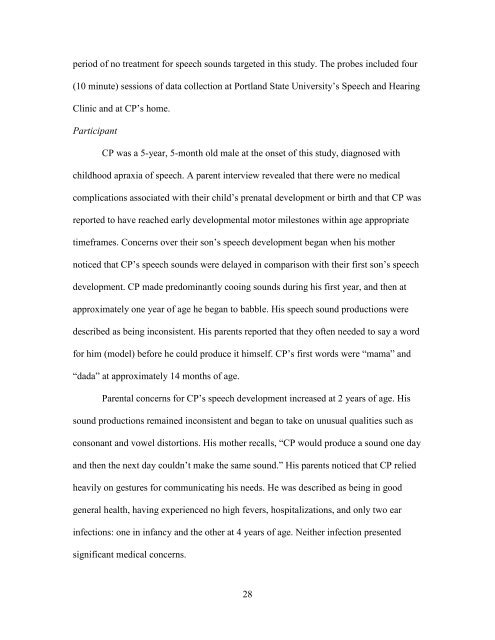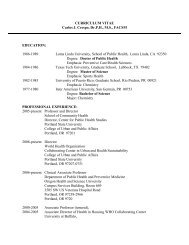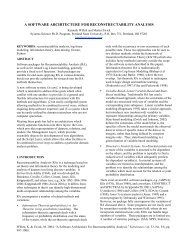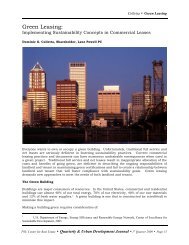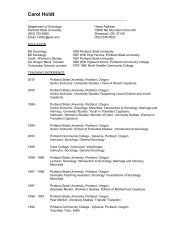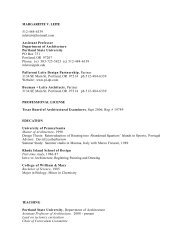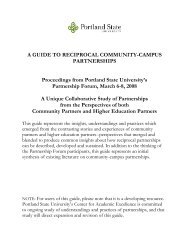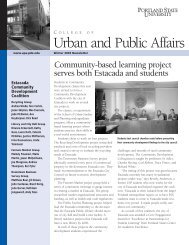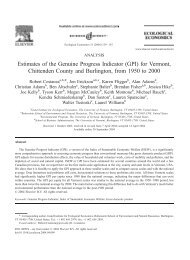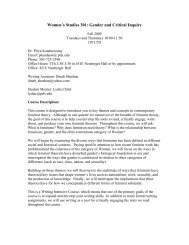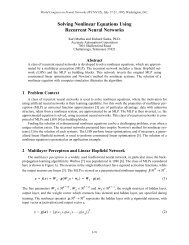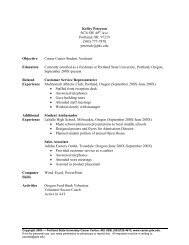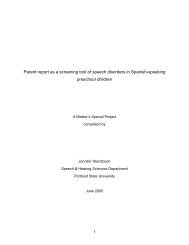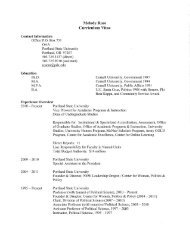Effects of integral stimulation therapy on speech - Portland State ...
Effects of integral stimulation therapy on speech - Portland State ...
Effects of integral stimulation therapy on speech - Portland State ...
You also want an ePaper? Increase the reach of your titles
YUMPU automatically turns print PDFs into web optimized ePapers that Google loves.
period <str<strong>on</strong>g>of</str<strong>on</strong>g> no treatment for <strong>speech</strong> sounds targeted in this study. The probes included four<br />
(10 minute) sessi<strong>on</strong>s <str<strong>on</strong>g>of</str<strong>on</strong>g> data collecti<strong>on</strong> at <strong>Portland</strong> <strong>State</strong> University’s Speech and Hearing<br />
Clinic and at CP’s home.<br />
Participant<br />
CP was a 5-year, 5-m<strong>on</strong>th old male at the <strong>on</strong>set <str<strong>on</strong>g>of</str<strong>on</strong>g> this study, diagnosed with<br />
childhood apraxia <str<strong>on</strong>g>of</str<strong>on</strong>g> <strong>speech</strong>. A parent interview revealed that there were no medical<br />
complicati<strong>on</strong>s associated with their child’s prenatal development or birth and that CP was<br />
reported to have reached early developmental motor milest<strong>on</strong>es within age appropriate<br />
timeframes. C<strong>on</strong>cerns over their s<strong>on</strong>’s <strong>speech</strong> development began when his mother<br />
noticed that CP’s <strong>speech</strong> sounds were delayed in comparis<strong>on</strong> with their first s<strong>on</strong>’s <strong>speech</strong><br />
development. CP made predominantly cooing sounds during his first year, and then at<br />
approximately <strong>on</strong>e year <str<strong>on</strong>g>of</str<strong>on</strong>g> age he began to babble. His <strong>speech</strong> sound producti<strong>on</strong>s were<br />
described as being inc<strong>on</strong>sistent. His parents reported that they <str<strong>on</strong>g>of</str<strong>on</strong>g>ten needed to say a word<br />
for him (model) before he could produce it himself. CP’s first words were “mama” and<br />
“dada” at approximately 14 m<strong>on</strong>ths <str<strong>on</strong>g>of</str<strong>on</strong>g> age.<br />
Parental c<strong>on</strong>cerns for CP’s <strong>speech</strong> development increased at 2 years <str<strong>on</strong>g>of</str<strong>on</strong>g> age. His<br />
sound producti<strong>on</strong>s remained inc<strong>on</strong>sistent and began to take <strong>on</strong> unusual qualities such as<br />
c<strong>on</strong>s<strong>on</strong>ant and vowel distorti<strong>on</strong>s. His mother recalls, “CP would produce a sound <strong>on</strong>e day<br />
and then the next day couldn’t make the same sound.” His parents noticed that CP relied<br />
heavily <strong>on</strong> gestures for communicating his needs. He was described as being in good<br />
general health, having experienced no high fevers, hospitalizati<strong>on</strong>s, and <strong>on</strong>ly two ear<br />
infecti<strong>on</strong>s: <strong>on</strong>e in infancy and the other at 4 years <str<strong>on</strong>g>of</str<strong>on</strong>g> age. Neither infecti<strong>on</strong> presented<br />
significant medical c<strong>on</strong>cerns.<br />
28


